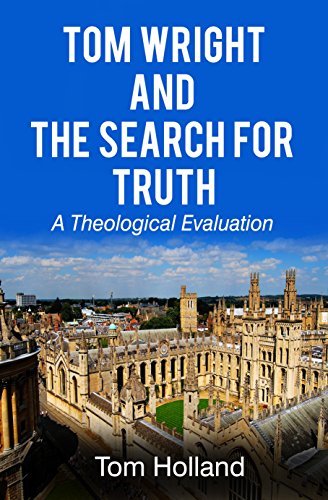A Brief Book Summary from Books At a Glance
By Nathan Sundt
About the Author
Tom Holland is a British scholar who is the Senior Research Fellow of Union School of Theology, Oxford, UK. He specializes in New Testament Studies and is a leading exponent of ‘Paschal New Exodus Theology’ in Pauline Studies.
Overview
Readers of Tom Wright’s creative energy in New Testament studies will greet Tom Holland’s Tom Wright and the Search for Truth with enthusiasm. A figure such as Wright cannot help but create many partisans, who stand ready to support or critique; just as certainly, though, a large cohort of scholars and preachers of the Pauline epistles looks forward to any work that interacts with Wright, especially in (1) his native Pauline epistles and (2) with a similarly broad scope of interest and synthesis. Holland matches Wright in his desire to understand both the Second Temple literature and the New Testament on their own terms. Interestingly, he matches Wright as well in several aspects of his biography and writing interests. Reformed critiques of Wright have often detailed particular treatments of a relevant passage or the effects of a reading on historical theology. Holland, however, engages with Wright in broad, synthetic questions about the development of Paul the Apostle and his worldview and about the way to read the New Testament as a whole. (Holland proposes his “Paschal New Exodus” model.) The book may, therefore, be helpful at several levels, whether one approves largely of Wright’s project and simply wishes to “probe further” (as Holland characteristically says) or whether one is suspicious of Wright’s whole picture and thinks some of its defects will be clearer when compared with a similarly broad canvas.
Table of Contents
1 Probing the Contours of Recent Research
2 Probing Saul and His Political Identity
3 Probing Paul and His Theological Identity
4 Probing Paul and His Intellectual Identity
5 Probing Further Uses of Hellenistic Language and Literature
6 Probing Paul’s Use of Second Temple Literature
7 Probing Paul’s Understanding of the Person of Christ (Christology)
8 Probing Paul’s Doctrine of the Atonement
9 Probing Wright’s Doctrine of Justification
10 Probing Paul’s Doctrine of Justification
11 Probing the Doctrine of Justification in Romans and Galatians
12 Probing Justification in the Remainder of Paul’s Letters
13 Reconciling Conflict and Review
Summary
Chapter 1. Probing the Contours of Recent Research
Chapter 1 explores the situation in New Testament scholarship; though very recently “wedded to Hellenistic studies,” New Testament interpretation, aided by eminent scholars such as Wright and discoveries such as the Dead Sea Scrolls, has re-Judaized its entire framework of interpretation, especially for a subject such as the Apostle Paul. The parting of the ways, according to Holland, sets up with what path the scholar takes to this Jewish return, whether primarily or exclusively in the Old Testament itself or whether through the prism of the Intertestamental literature—which was set on a far more Jewish footing with their discovery at Qumran in 1947 (in Hebrew and in a Jewish sect). Wright sees himself standing upon the work of G. B. Caird and E. P. Sanders and establishing a nuanced understanding of the Intertestamental history and literature as the backdrop for interpreting Paul.
Holland commends much in Wright’s contributions—the profound power of Jesus and the Victory of God to remove Historical Jesus scholarship from an entire generation of skepticism is now a commonplace. Holland registers his concerns: as a full corpus, the Intertestamental literature is far more incomplete than Wright indicates. Further, as individual writings the literature’s meaning is far more undetermined or multivalent than Wright implies. The Old Testament, Holland argues, is itself fit to furnish Pauline concepts and terms. Insofar as it relates to the (1) Jewishness of Paul, (2) the overall shape and impact of the covenants in scripture, and (3) the use of the new Exodus theme, the book is a scrimmage between teammates. However, Holland also contends that (1) the Intertestamental literature is ill-fit for Pauline interpretation, (2) that Wright has not sufficiently de-Hellenized the context of much of his concepts, and (3) that Holland’s ‘pascal new exodus’ theme yields a model native to scripture and sufficient to explain and set forth the apostle to the Gentiles.
Chapter 2. Probing Saul and His Political Identity
Chapter 2, “Probing Saul and His Political Identity,” examines a prominent feature of Wright’s model, picked up by much subsequent New Testament scholarship: his use of the “hero traditions of Phineas, Elijah, and the Maccabean martyrs” to reconstruct a possible psychology for Saul of Tarsus (from which would come the memory and intention of Paul the Apostle). Wright argues that Galatians and Romans 11:2–5 show the apostle going “into Arabia to re-enact the journey of Elijah and his meeting with God at Horeb.” Holland finds Wright’s interpretation impossible since “neither Elijah nor Phineas are mentioned in the letter to the Galatians” and because “Paul, in fact, compares [his ministry] with that of Moses,” not Elijah.
[To continue reading this summary, please see below....]The remainder of this article is premium content. Become a member to continue reading.
Already have an account? Sign In
